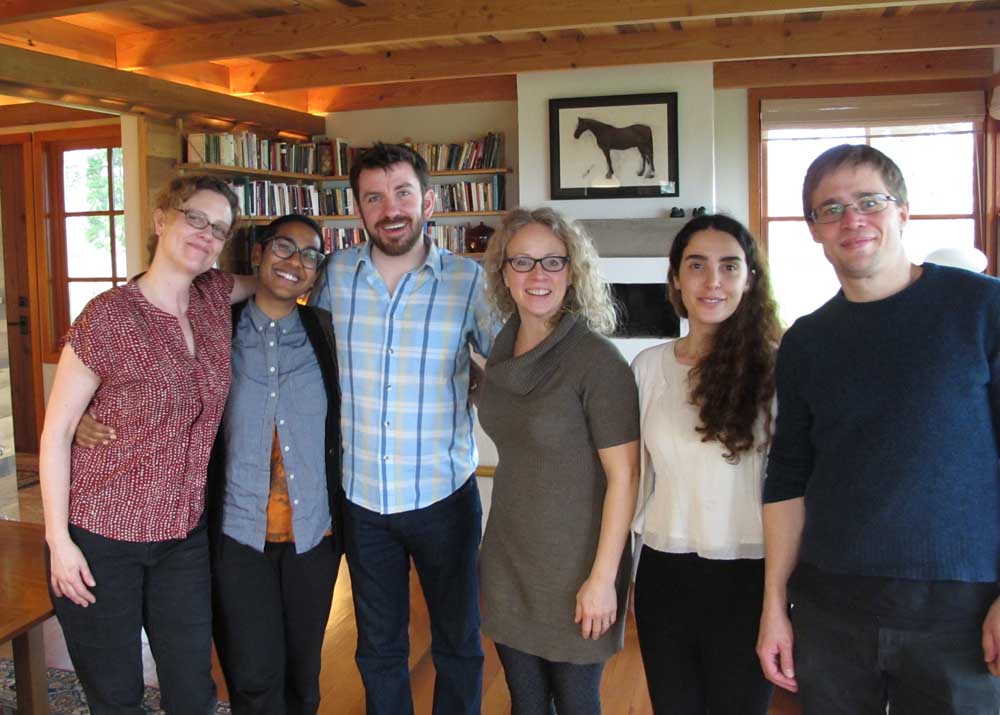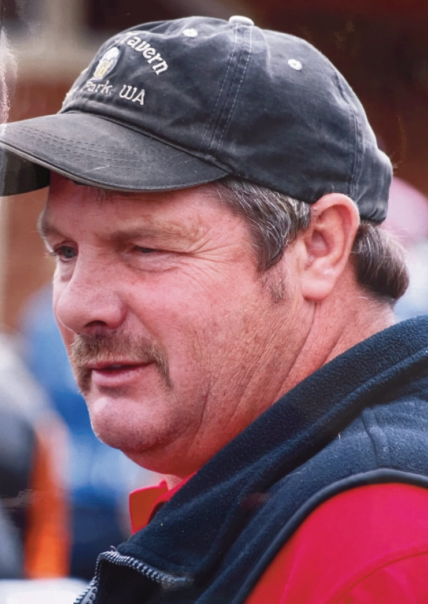Coast Chronicles: These melancholy Indian summer days
Published 7:31 am Monday, October 17, 2022

- Iranian writer Aida Moradi Ajani (second from right) with her Willapa Bay AiR cohort of 2017 (from left: Gina Borg, Shruti Swamy, Tim Peck, Jules Gibbs and Andrew Hladky).
We must risk delight. We can do without pleasure,
Trending
but not delight. Not enjoyment. We must have
the stubbornness to accept our gladness in the ruthless
furnace of this world.
Trending
—Excerpted from “A Brief for the Defense,” by Jack Gilbert
Fall to winter
Pinky-apricot maple leaves have fallen scattered in the side yard. The dandelions have slowed, only a few still thrusting up their yellow heads. The V’s of geese turn south over the bay’s mudflats. Ribbons of fog cover the back road in the early mornings or just after dark. And, one morning up earlier than the sun, in moonlight shadows, I found Orion slipping over the southern horizon, our winter hunter come out to wander; though this past weekend, sunny days felt almost like summer, too warm to be October.
It’s that strange mix of Indian Summer days, so beautiful and poignant. That interstitial time between bright summer, that we hope against hope will linger, and the winter we know is coming. It’s time to enjoy that last crop of peaches — the O’Henrys have been juicy beyond all measure this year! — and to roll into apple, pear and pumpkin weather and the tastes of autumn and Thanksgiving.
Fall is my favorite time of year, perhaps because of this ambiguity: a little bit of this and a little bit of that; a representation of the sweet melancholy of life in all its quirkiness and surprise. Never one thing but a mix of celebration and sadness together. Fall is the time to appreciate what we’ve had, the bounty of summer so full of lively events, colors, music, food, fun, friendship — we’re alive and the world is still spinning — and all manner of exciting discoveries.
In Jack Gilbert’s poem, above, his first line is “Sorrow everywhere. Slaughter everywhere.” There is a lot of suffering in the world. Does it seem more than usual? Or is it only because of the Internet that we are just seeing everything everywhere now, when before we had only our backyards to worry about?
Unless we turn our eyes away, just in front of us is the attempted destruction of the Ukrainian people and their culture, though their military bravery and their advances are also present. Putin is a madman of epic proportions. But we don’t need to go that far afield to experience horror. In our own country we have political candidates running to govern us who lie outright or can’t even speak our language. (In his recent debate, Herschel Walker said about the cost of insulin, and this is a direct quote, “I believe in reducing insulin, but at the same time, you got to eat right, because he may not know and I know many people that’s on insulin, and unless you have a eating right, insulin is doing you no good.” Say no more — please.)
Meanwhile, Aida in Iran
Five years ago, I and several of my poet friends gave a reading with Willapa Bay Artist in Resident Aida Moradi Ajani, who lives and writes in Tehran. If you’re watching the news you know that the Iranian women have been demonstrating in the streets in the aftermath of the murder of Mahsa Amini by the so called “morality police” for wearing a hajib improperly. This misogynistic authoritarian regime is being bravely confronted by young women fed up with being under the thumb of the power brokers in their country; and they’ve rallied the Iranian people to action too. They’re having their say, but those defending this regime have only accelerated their murderous push-back. Where will the balance land?
Cyndy Hayward, executive director of Willapa Bay AiR wrote to ask Aida how she was doing. Aida’s notes have been heartrending. She wrote, “Hi dear Cyndy, I am ok but the situation is so messy, people are killed in the street, most of the time we are blocked from accessing the internet. I really hope for something good for my country. There is a lot of pressure on us as writers. We are not allowed to say or write something. I am still waiting for the result of the FBI check visa. If I was out of Iran I’d start to write against this situation better. A few days ago they asked me to stop writing on twitter, they threatened me, but I still write, I will write. Thank you for this email. It is like a light. Much Love, Aida.”
Ten days later we heard from her again, “Dear Cyndy, your note means the world to me. I am so lucky to meet you and my other friends there. Having friends like you is the strength of my heart. These days, protests have spread to schools and the regime even kills high school children. They use tear gas in elementary schools. Many young people are arrested and killed in the streets. We as writers are under pressure. After every tweet and post, they call us and threaten us. Anger Anger makes us stop being afraid and only think about moving forward. The heads of the regime kill innocent children while the children of the regime leaders study and work and live freely in America and other countries. We in Iran hope that the American government will deport them.
I’ve written some personal essays and I wish I could publish them in the New Yorker or somewhere that could be widely heard. I would appreciate it if you know someone in this journal let me know. Dear Cyndy, I believe in response, we must speak out for our friends, colleagues and family members. Dear Cyndy, I really miss you. I hope from the bottom of my heart to see you again one day. Like that night you invited me and we watched a documentary about the Middle East. I hope we watch a documentary about Free Iran one day. Much Love, Aida.”
The power of words, music and the arts
The problems facing our country aren’t trivial, but we’re not being slaughtered in the streets (er…at least not if we’re white). Suffering in America abounds, in big and small ways. Thousands of Floridians are now homeless. Women in Ohio (and many other anti-abortion states) can’t get proper prenatal care. Shooting deaths continue nation-wide. Officials say we’re heading into a winter covid spike. And, yes, according to the Living Planet Index, we’ve lost 69% of our animal populations since 1970. This is almost more than a heart can bear. Still as a writer I’m able to live my life and share my thoughts. (In fact, the Chinook Observer has again won first place for general excellence from the Washington Newspaper Publishers Association along with several other staff members; my contributions also received some accolades.)
Amidst these days of transition to darker wetter weather, there are many things to be grateful for. Near the end of Jack’s poem he also writes, “We must admit there will be music despite everything.” And yes, we’ve had it: three thrilling performances of Water Music this past weekend; and an evening of local musicians, featuring women song writing, at the Performing Arts Center. Then there’s the brilliant range of local art and craftsmanship at BOLD and the Bay Avenue Gallery. And the beginning of the seasonal windup of community holiday giving.
So replenish your woodpile, get your stack of books for winter reading in order, support every good cause you’re able to, and savor these last warm Indian summer days.









